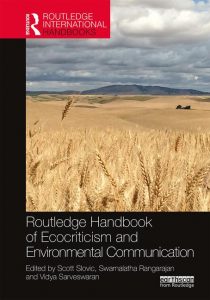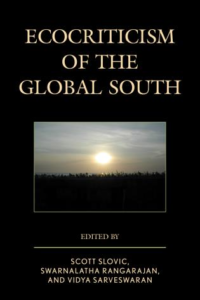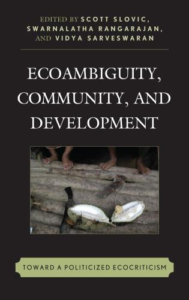Books
The Routledge Handbook of Ecocriticism and Environmental Communication charts the history of the relationship between ecocriticism and environmental communication studies, while also highlighting key new paradigms in information studies, diverse examples of practical applications of environmental communication and textual analysis, and the patterns and challenges of environmental communication in non-Western societies. Contributors to this book include literary, film and religious studies scholars, communication studies specialists, environmental historians, practicing journalists, art critics, linguists, ethnographers, sociologists, literary theorists, and others, but all focus their discussions on key issues in textual representations of human–nature relationships and on the challenges and possibilities of environmental communication. The handbook is designed to map existing trends in both ecocriticism and environmental communication and to predict future directions.This handbook will be an essential reference for teachers, students, and practitioners of environmental literature, film, journalism, communication, and rhetoric, and well as the broader meta-discipline of environmental humanities.
This new book is the second volume in a two-volume “mini-series” devoted to representing diverse and innovative ecocritical voices from throughout the world, particularly from developing nations (the first volume, Ecoambiguity, Community, and Development, appeared in 2014). The vast majority of existing ecocritical studies, even those which espouse the “postcolonial ecocritical” perspective, operate within a first-world sensibility, speaking on behalf of subalternized human communities and degraded landscapes without actually eliciting the voices of the impacted communities. We have sought in Ecocriticism of the Global South to allow scholars from (or intimately familiar with) underrepresented regions to “write back” to the world’s centers of political and military and economic power, expressing views of the intersections of nature and culture from the perspective of developing countries. This approach highlights what activist and writer Vandana Shiva has described as the relationship between “ecology and the politics of survival,” showing both commonalities and local idiosyncrasies by juxtaposing such countries as China and Northern Ireland, New Zealand and Cameroon. The two volumes of the Ecocriticism of the Global South Series point to the need for further cultivation of the environmental humanities in regions of the world that are, essentially, the front line of the human struggle to invent sustainable and just civilizations on an imperiled planet
Ecoambiguity, Community, and Development takes stock of cultural and environmental contexts in many different regions of the world by exploring literature and film. Artists and scholars working in the social ecology, environmental justice, and postcolonial arenas have long recognized that as soon as we tug on a thread of “ecodegradation,” we generally find it linked to some form of cultural oppression. The reverse is also often true. In the spirit of postcolonial ecocriticism, the studies collected by Scott Slovic, R. Swarnalatha, and Vidya Sarveswaran emphasize the impossibility of disentangling environmental and cultural problems.



